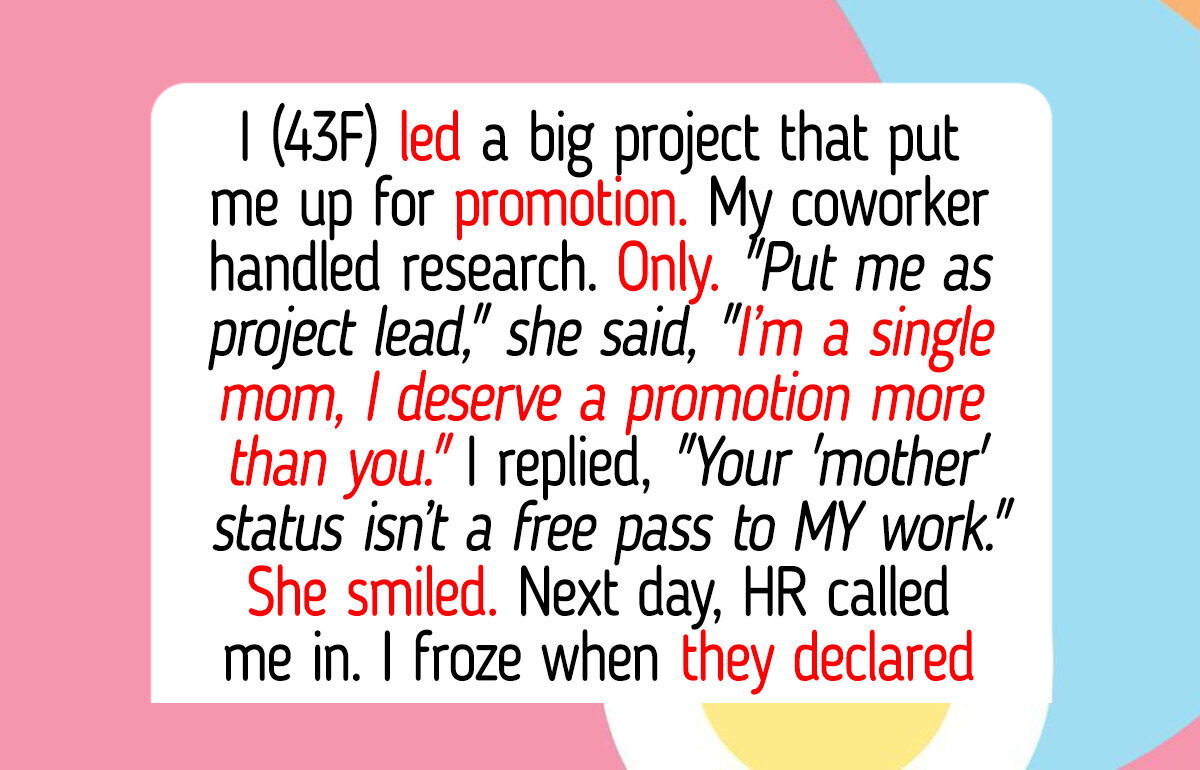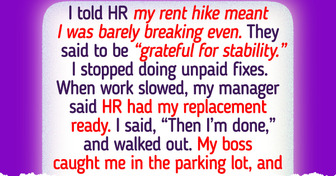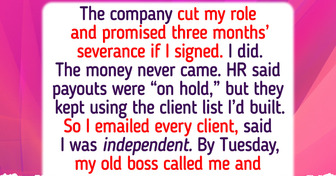Sandy, telling a coworker (in ANY phrasing) that their situation is "irrelevant" in front of HR-era corporate culture is basically volunteering to step on a landmine! You didn’t have to give her the project lead…but you also didn’t have to choose the most HR-triggering wording imaginable!
I Refused to Give Up My Promotion to My Single-Mom Coworker—Now I’m the Office Villain

Workplace fairness and recognition can quickly become emotional topics, especially when personal circumstances and career ambitions collide. Many people today struggle with balancing empathy and professionalism, and these moments often lead to heated debates about what’s truly “fair” at work. Recently, a Bright Side reader sent in a letter describing a situation that sparked exactly this kind of dilemma.
Here’s Sandy’s letter:

Hi Bright Side,
As a 43-year-old woman who’s child-free, I’ve always focused fully on my work and the responsibilities I take on. Recently, I led a big project that saved the firm a fortune, and put
me up for promotion.
My coworker (32F) handled research. Only. Then she came up to me and said, “Put me as project lead. I’m a single mom, I deserve a promotion more than you.”
Caught of guard, I replied, “Your ’mother’ status isn’t a free pass to MY work!”
She smiled.
Next day, HR called me in. I froze when they declared that I’m “gatekeeping opportunities from single parents.” I sat there, trying to understand how this had flipped so fast.
They explained: “We received a complaint, a serious one. Apparently you told a colleague her parental status was irrelevant, and you refused to share credit on a major project.”
Share credit? She wanted the lead. I tried to keep my voice steady, “I didn’t say anything about her being a parent. I said being a mother doesn’t entitle her to leadership on work she didn’t lead.”
“We’re not disciplining you,” they said, “but we need to investigate. Until then, we suggest stepping back from project communications.”
I blinked. “Stepping back? That project is entering its final audit.” They shrugged, “That’s why we want to prevent... conflicts.”
I walked out, feeling like the hallway was tilting sideways. My coworker smirked, “Rough meeting?” She looked at me with a kind of triumphant pity.
“You know... leadership is about more than doing the work. It’s about empathy. HR understands that!” she said.
Now I can’t help wondering: did I actually handle this wrong? Should I have given her credit for work she didn’t do, simply because I’m child-free, and she’s a mother?
That project was my effort from start to finish, and it feels unfair to have that questioned. I’m genuinely struggling with whether I should have approached this differently.
— Sandy

You did the lead work you deserve the recognition and raise. Suggest you update your resume.
Thank you, Sandy, for sending us your story and trusting us with such a sensitive workplace dilemma. Here are 4 pieces of advice that may help you navigate this situation with clarity and confidence.
Document Everything Before Emotions Take Over.
In a situation where someone twists your words and motives, detailed documentation becomes your strongest shield. Write down timelines, responsibilities, emails, and deliverables from the project to show exactly who handled what. This helps HR see the objective picture rather than relying on emotional claims.
It also protects you if your coworker tries to escalate her accusations or rewrite history. The more organized your proof is, the harder it is for misinformation to stand.
Recognize Your Coworker’s Strategy—Then Stop Playing Into It.
Your coworker isn’t just asking for credit; she’s leveraging personal identity to pressure you and HR into giving her authority she didn’t earn. That smile and her comment afterward suggest she knew exactly what she was doing.
Instead of reacting to her provocations, disengage from personal exchanges and only communicate through email or documented channels. This protects you and removes the emotional fuel she seems to thrive on. People who manipulate workplace empathy often lose power when interactions are strictly professional.
Reframe the Conversation With HR Calmly and Strategically.

Document everything. I would have asked her to put her request in a email. Then take that to HR. She shouldn't get credit for your work but in this day an age people get offended and turn HR against you. Next time say let's communicate this by email so there are no misunderstandings and then send the emails to HR asking them how should I respond.
HR may have acted quickly because the complaint was presented as discrimination, so now you need to redirect the narrative with clarity. Don’t defend yourself emotionally—explain the project structure, your roles, and her responsibilities using neutral, factual language.
Emphasize that disagreeing about leadership isn’t the same as disregarding her parental status. Let them know you support fair opportunities, but not at the expense of accuracy or merit. This helps HR see you as someone upholding professional standards rather than “gatekeeping.”
Protect Your Reputation While Reclaiming Your Leadership Role.
Since you’ve been asked to step back during the investigation, now’s the time to quietly reinforce your credibility with those who know your work. Check in with stakeholders, partners, or supervisors—factually, not defensively—to ensure project details remain on track without implying conflict.
This keeps your expertise visible even while HR sorts things out. Once the review is complete, request a follow-up meeting to discuss restoring your role based on the project’s documented history. Your reputation is built on years of results, not a single accusation, and you have the right to protect that.
Even the calmest person can hit a limit when their professional role and personal boundaries begin to collide.
I Refused to Cover for a ‘New Mom’ Coworker—HR Got Involved
Comments
Let’s be real. it sounds like you were more shocked that she even asked than upset about the actual complaint. Research still matters, and acting like her part was nothing compared to your "big project" vibe? Yeah…people notice that attitude fast.
You didn’t get tripped up because she’s a mom, you got tripped up because she knows how to handle office politics and you expected your hard work to speak for itself. Promotions aren’t just about who did the most, they’re also about how things look, how you communicate, and not giving someone the perfect line to throw at HR.
Being a good leader means being diplomatic with your words if possible. Coworker sounds entitled and her single mom status does not mean opportunities are owed to her, but have a care with how you say no. "Coworker, your research was amazing on this project and I'm going to make sure management knows it at the presentation. Let's discuss leadership opportunities after we close out this project." Document the interaction to cya if coworker presses the issue.
Coworker might have complained either way, but at least you look reasonable.
Related Reads
Our “Romantic” Vacation Was Hijacked by My Wife’s Family—And It Forced Us to Reevaluate Our Relationship

12 Stories That Show the Bravest Thing You Can Do Is to Be Kind

12 Moments That Show Quiet Kindness Is Much Stronger Than the World Thinks

HR Told Me to Be Grateful for Pay That No Longer Covers Rent — Then Reality Hit Harder

11 Stories That Prove First Love May Be Short, but Leaves a Lasting Mark Forever

My Family Excluded My Girlfriend From Christmas Because We’re Not Married

I Refused to Pay for Our Valentine’s Dinner—Then I Learned the Heartbreaking Truth

17 Moments That Remind Us Kindness Is a Choice, Not a Mood

I Lost My Job to “Restructuring” and My Severance Disappeared, Then I Turned the Tables

15 Stories That Inspire Us to Choose Kindness, Even If the World Gets Ugly

14 People Who Proved a “Simple Renovation” Can Go Completely Off Script

I Refuse to Pay for Work Trip Expenses Out of My Own Pocket—HR Got Involved
